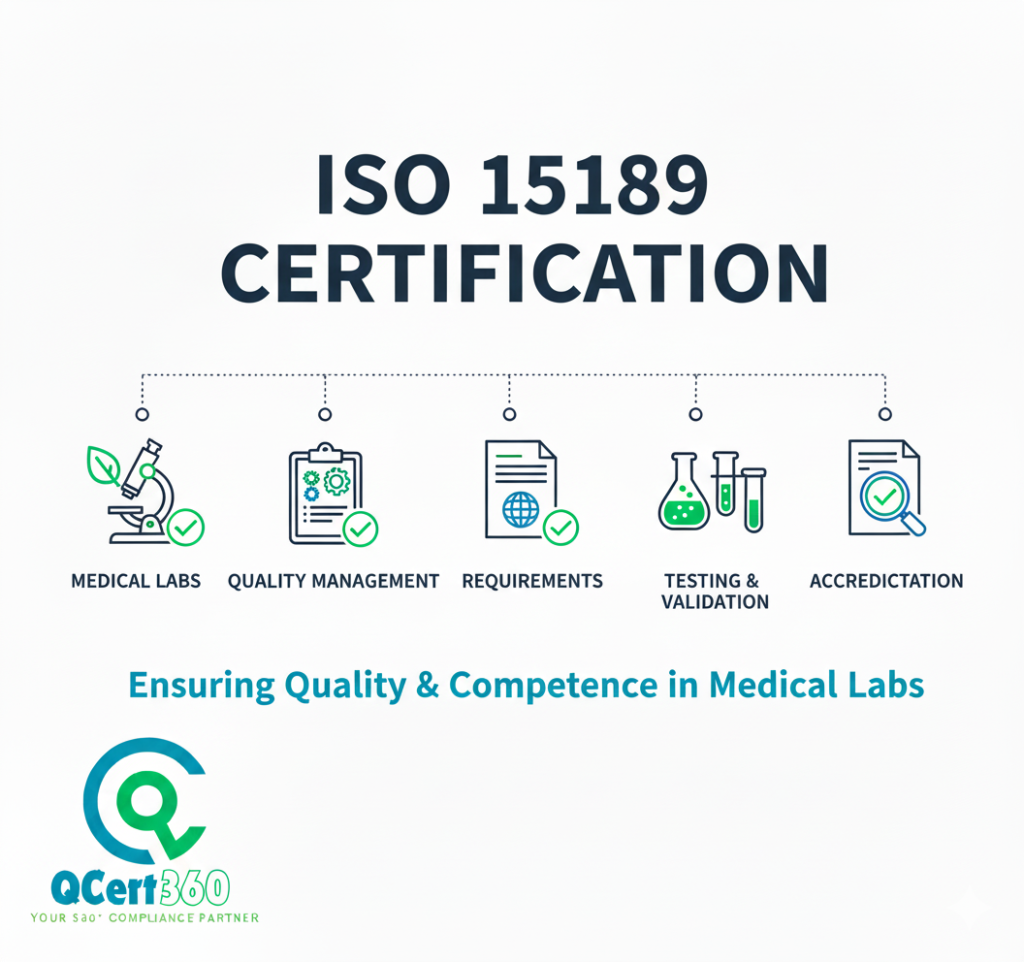ISO 15189:2022 Certification
ChatGPT said:
ISO 15189 is the international standard for medical laboratories, specifying requirements for quality and competence in medical testing. It covers all aspects of laboratory operations, including management systems, technical procedures, personnel competence, equipment calibration, and result reporting. The standard ensures accurate, reliable, and timely diagnostic results, supporting patient safety and effective clinical decisions. ISO 15189 emphasizes continual improvement, risk management, and adherence to regulatory and professional requirements. Certification demonstrates a laboratory’s commitment to high-quality practices, credibility, and international recognition. Applicable to clinical and diagnostic laboratories of all sizes, ISO 15189 strengthens trust among healthcare providers, patients, and stakeholders.
Request a Call Back
Get Free Consultation
Have any Questions?
Mail us Today!
contact@qcert360.com
ISO 15189:2022 Certification – Ensuring Quality and Competence in Medical Laboratories
Medical laboratories play a critical role in patient diagnosis and treatment, making accuracy and reliability non-negotiable. ISO 15189:2022 certification provides an internationally recognized framework for laboratory quality management, ensuring consistent, competent, and reliable testing services that directly impact patient care.
What is ISO 15189 certification?
ISO 15189:2022 is an international standard specifying requirements for quality and competence in medical laboratories. It combines management system principles with technical requirements, covering everything from personnel qualifications and equipment calibration to test methods, result validation, and documentation. The standard applies to laboratories of all sizes and types, aiming to ensure accurate, timely, and reproducible results while maintaining patient safety and confidentiality.
Why ISO 15189 Certification Matters for Laboratories
Medical laboratories operate in high-stakes environments where even a small error can directly impact diagnosis, treatment, and patient outcomes. ISO 15189 provides a structured framework that safeguards quality and reliability across all testing processes.
Reliable testing – Establishes strict controls to ensure laboratory results are accurate, consistent, and reproducible, reducing the risk of misdiagnosis.
Regulatory compliance – Aligns laboratories with both international standards and local healthcare regulations, avoiding penalties and ensuring recognition by authorities.
Patient safety – Minimizes risks of diagnostic errors by standardizing procedures, staff competence, and equipment calibration.
Operational efficiency – Improves workflows, resource allocation, and turnaround times, making laboratories more productive and cost-effective.
Stakeholder trust – Demonstrates competence and accountability, building confidence among patients, clinicians, insurers, and regulatory bodies.

Benefits:
Enhanced Marketability:
Obtaining certification boosts brand visibility and credibility, making products and services more attractive to consumers and increasing market share in global markets.
Consumer Trust & Satisfaction:
Certification assure customers of consistent quality, safety, and reliability, fostering trust, increasing brand loyalty, and ensuring higher levels of customer satisfaction.
Regulatory Compliance
Certification ensure compliance with global standards and regulations, helping businesses avoid legal issues, penalties, and enabling smoother entry into diverse international markets.
Competitive Advantage
Holding certification distinguishes a business from competitors, signaling superior quality and reliability, and positioning the company as an industry leader in the market.
Global Expansion
Certification provide access to new international markets, demonstrating that a business meets global standards, which facilitates expansion and opens doors to new business opportunities worldwide.
Risk Mitigation & Efficiency
Certifications help identify and mitigate risks, streamline operations, and reduce errors or defects, ensuring efficiency and consistency while safeguarding against operational disruptions.
Core Elements of ISO 22000 certification
ISO 15189 integrates quality management principles with technical excellence to ensure laboratories operate with reliability and integrity. The standard emphasizes:
Leadership and Management – Strong governance and accountability from leadership to foster a culture of quality, competence, and regulatory compliance.
Personnel Competence – Ensuring laboratory staff are well-qualified, undergo continuous training, and have their skills routinely assessed.
Equipment and Infrastructure – Laboratories must use properly calibrated, validated, and well-maintained equipment in an environment designed for accuracy and safety.
Pre-analytical, Analytical, and Post-analytical Processes – Clear, standardized workflows for specimen collection, handling, testing, and reporting to minimize errors at every stage.
Quality Control and Assurance – Ongoing internal and external checks to confirm the accuracy, precision, and reliability of test results.
Documentation and Records – Comprehensive recordkeeping for full traceability, audit readiness, and regulatory compliance.
Continuous Improvement – Regular audits, management reviews, and corrective actions to adapt to new risks, technologies, and regulations.
Benefits of ISO 15189 Certification for Lbas
Achieving ISO 15189 certification provides medical laboratories with significant advantages that directly impact patient outcomes and organizational performance:
Enhanced Test Reliability – Standardized processes ensure test results are accurate, consistent, and reproducible, reducing the risk of diagnostic errors.
Regulatory Compliance – Demonstrates conformity with international standards and national health regulations, ensuring legal and professional accountability.
Improved Patient Care – Reliable testing supports faster, more precise diagnoses, enabling clinicians to make informed treatment decisions with confidence.
Operational Efficiency – Streamlined workflows, effective resource allocation, and preventive maintenance reduce downtime and improve laboratory productivity.
Credibility and Trust – Certification reassures patients, healthcare providers, insurers, and regulators of the laboratory’s competence and commitment to quality.
By combining quality management with technical excellence, ISO 15189 strengthens both patient safety and institutional reputation.
Who needs to get ISO 15189 Certified?
ISO 15189 certification applies to a wide range of laboratories that play a vital role in healthcare and research. Key stakeholders include:
Clinical and Diagnostic Laboratories – Hospitals, private testing centers, and specialized labs that deliver critical diagnostic results.
Research Laboratories with Clinical Applications – Institutions conducting human-related studies that require accurate, validated, and reproducible results.
Public Health Laboratories – Facilities responsible for disease surveillance, outbreak response, and community health monitoring.
Healthcare Networks – Centralized or integrated labs that support multiple hospitals, clinics, and medical centers.
Ultimately, any laboratory seeking to demonstrate technical competence, safeguard patient outcomes, and achieve recognition on a national or international scale can benefit from ISO 15189 certification.
Continuous Improvement Under ISO 15189:2022 certification
ISO 15189 emphasizes ongoing improvement through internal audits, quality control, and performance reviews. Laboratories must regularly evaluate procedures, staff competency, equipment performance, and regulatory compliance. Feedback from clinicians, patients, and accreditation bodies guides corrective actions, ensuring processes evolve with new medical technologies, testing methodologies, and healthcare standards. Continuous improvement strengthens laboratory reliability, enhances patient safety, and maintains accreditation readiness over time.
Conclusion: Conclusion: Qcert360 Expertise in getting ISO 15189 certification service
ISO 15189:2022 certification is not just about meeting international requirements—it represents a laboratory’s dedication to accuracy, patient safety, and reliable healthcare outcomes. In an environment where diagnostic errors can impact lives, achieving this certification demonstrates technical competence and a strong quality culture.
At Qcert360, we provide end-to-end guidance for medical laboratories pursuing ISO 15189. Our support covers every stage of the journey, from gap analysis and process documentation to staff competency training, internal audits, and accreditation preparation. We work closely with your team to strengthen laboratory workflows, ensure compliance with both global and local regulations, and embed best practices that drive continuous improvement.
By partnering with Qcert360, laboratories not only achieve ISO 15189 certification efficiently but also establish long-term credibility with patients, healthcare providers, and authorities. The result is enhanced trust, improved diagnostic quality, and a stronger reputation in the healthcare sector.
Sectors & Industries we serve
Our Services
ISO Standards
- ISO 9001 Certification
- ISO 14001 Certification
- ISO 45001 Certification
- ISO 22000 Certification
- ISO 17025 Certification
- ISO 27001 Certification
- ISO 13485 Certification
- ISO 20000-1 Certification
- ISO 41001 Certification
- ISO 22716 Certification
- ISO 50001 Certification
- ISO 22301 Certification
- ISO 29993 Certification
Product Certifications
Other international standards
- FSSC 22000 Certification
- HIPAA
- HACCP Certification
- SA 8000 Certification
- GMP Certification
- GDPR
- GDP Certification
- GLP Certification
- Certificate of Conformity


